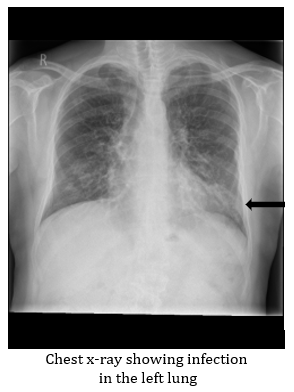What is a chest infection?
The clinical word used for a chest infection is an “exacerbation”. An exacerbation (or chest infection) is when there is a flare up of your normal condition.
 What are the symptoms of a chest infection that need antibiotics?
What are the symptoms of a chest infection that need antibiotics?
If you feel unwell and are coughing up more phlegm than normal and the phlegm is a darker yellow, darker green, or darker brown then this is when you need an antibiotic as soon as possible.
Other symptoms include tiredness, shortness of breath and feeling feverish (body feeling very hot).
Infections normally occur over a few days but sometimes symptoms appear quickly.

How do you diagnose a chest infection?
Your doctor will usually be able to diagnose a chest infection from your symptoms and by examining you (e.g. listening to your chest). Often patients know themselves when they have a chest infection, especially if they are prone to repeated exacerbations.
Occasionally a chest x-ray may be taken, for example, if a patient is not improving on appropriate antibiotics or if there is concern about the diagnosis of a chest infection.
A personalised self-management plan can help patients in identifying early symptoms of a chest infection and how to manage them (available in the bronchiectasis clinic).
Last Reviewed -10th July 2019

